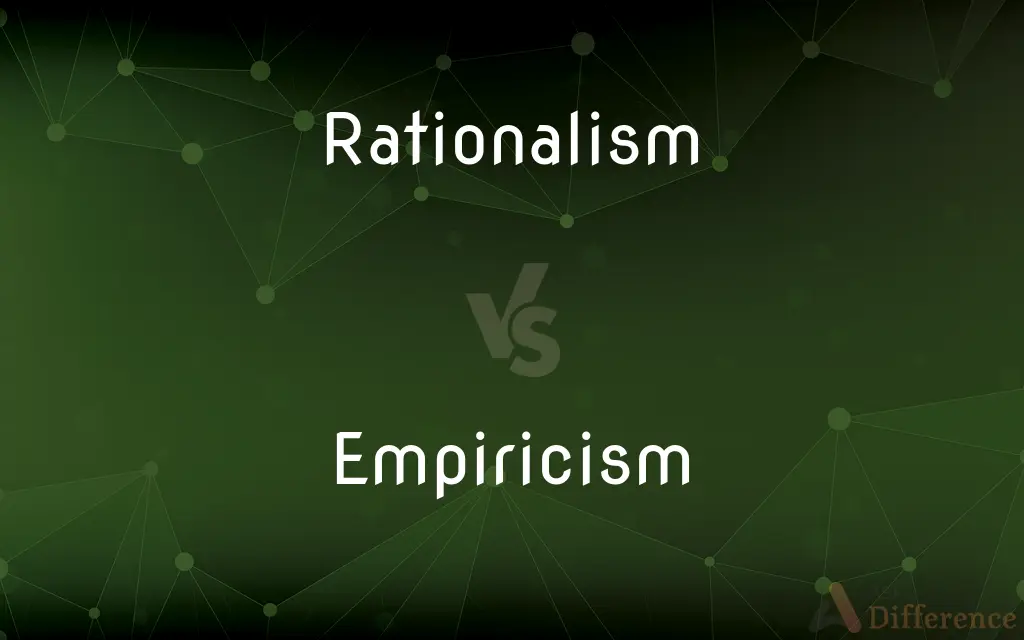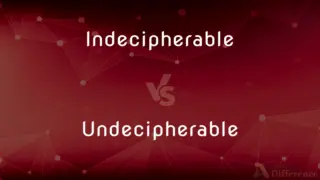Rationalism vs. Empiricism — What's the Difference?
Edited by Tayyaba Rehman — By Fiza Rafique — Updated on October 10, 2023
Rationalism emphasizes reason and logic as primary sources of knowledge; Empiricism stresses experience and sensory observation.

Difference Between Rationalism and Empiricism
Table of Contents
ADVERTISEMENT
Key Differences
Rationalism and Empiricism are both philosophical stances that address the origin and nature of human knowledge. Rationalism believes that certain truths can be known through reason and intellectual intuition without needing sensory experience. It posits that there are innate ideas or principles embedded in human reasoning, which act as the foundation for knowledge. For rationalists, deductive reasoning plays a pivotal role, and logical truths can be discerned independent of any empirical evidence.
In contrast, Empiricism asserts that all knowledge stems from sensory experience. Empiricists deny the existence of innate ideas, suggesting instead that the mind is a blank slate at birth, waiting to be written upon by experiences. The primary tool for empiricists is observation, often bolstered by scientific experimentation. For them, unless a claim can be verified through empirical observation or is analytically true (like mathematical truths), it lacks a firm foundation.
While Rationalism places faith in the power of intellect and inherent reason, Empiricism prioritizes external experiences and the data our senses provide us. Rationalism might argue that certain truths are self-evident and can be ascertained through contemplation alone. Empiricism, on the other hand, would challenge such claims by insisting on empirical proof or observation as a test for their veracity.
The debate between Rationalism and Empiricism delves deep into how we know what we claim to know. Do we rely on our ability to reason and deduce truths from foundational principles? Or do we depend on our experiences, observing the world around us to inform our understanding? These differing viewpoints have profound implications for areas like science, ethics, and metaphysics.
In essence, while Rationalism and Empiricism both seek to elucidate the origins and validity of knowledge, they offer contrasting methodologies. Rationalism looks inward to the capacities of reason, while Empiricism looks outward to the sensory experiences the world provides.
ADVERTISEMENT
Comparison Chart
Source of Knowledge
Reason and intellectual intuition
Sensory experience
Belief in Innate Ideas
Yes
No
Reliance on
Deductive reasoning
Observation and experimentation
Main Proponents
René Descartes, Baruch Spinoza, Gottfried Leibniz
John Locke, George Berkeley, David Hume
Views on Scientific Method
Secondary to pure reason
Central, with emphasis on observation and empirical evidence
Compare with Definitions
Rationalism
Rationalism believes in knowledge derived from reason.
Descartes' I think, therefore I am exemplifies the rationalist's trust in inherent reason.
Empiricism
Empiricism relies heavily on sensory observation.
His empiricism led him to trust only what could be observed and measured.
Rationalism
Rationalism posits innate ideas independent of experience.
His belief in the innate concept of justice was rooted in Rationalism.
Empiricism
Empiricism values the scientific method.
Grounded in empiricism, she needed experimental evidence to accept a claim.
Rationalism
Rationalism emphasizes deductive reasoning.
Through rationalism, he concluded that certain truths were universal.
Empiricism
Empiricism suggests reason alone can't lead to all truths.
Challenging rationalist notions, he used empiricism to argue that knowledge is experientially based.
Rationalism
Rationalism suggests some truths are self-evident.
Claiming the existence of a higher power, he turned to rationalism to defend his stance.
Empiricism
In philosophy, empiricism is a theory that states that knowledge comes only or primarily from sensory experience. It is one of several views of epistemology, along with rationalism and skepticism.
Rationalism
In philosophy, rationalism is the epistemological view that "regards reason as the chief source and test of knowledge" or "any view appealing to reason as a source of knowledge or justification". More formally, rationalism is defined as a methodology or a theory "in which the criterion of the truth is not sensory but intellectual and deductive".In an old controversy, rationalism was opposed to empiricism, where the rationalists believed that reality has an intrinsically logical structure.
Empiricism
Empiricism denies the existence of innate ideas.
In his empiricist view, the mind was a blank slate at birth.
Rationalism
Reliance on reason as the best guide for belief and action.
Empiricism
The view that experience, especially of the senses, is the only source of knowledge.
Rationalism
(Philosophy) The theory that the exercise of reason, rather than experience, authority, or spiritual revelation, provides the primary basis for knowledge.
Empiricism
Employment of empirical methods, as in science.
Rationalism
(philosophy) The theory that the reason is a source of knowledge independent of and superior to sense perception.
Empiricism
An empirical conclusion.
Rationalism
(philosophy) The theory that knowledge may be derived by deductions from a priori concepts (such as axioms, postulates or earlier deductions).
Empiricism
The practice of medicine that disregards scientific theory and relies solely on practical experience.
Rationalism
A view that the fundamental method for problem solving is through reason and experience rather than faith, inspiration, revelation, intuition or authority.
Empiricism
Medicine as practised by an empiric, founded on mere experience, without the aid of science or a knowledge of principles; folk medicine, quackery.
Rationalism
Elaboration of theories by use of reason alone without appeal to experience, such as in mathematical systems.
Empiricism
(philosophy) A doctrine which holds that the only or, at least, the most reliable source of human knowledge is experience, especially perception by means of the physical senses. (Often contrasted with rationalism.)
Rationalism
The doctrine or system of those who deduce their religious opinions from reason or the understanding, as distinct from, or opposed to, revelation.
Empiricism
A pursuit of knowledge purely through experience, especially by means of observation and sometimes by experimentation.
Rationalism
The system that makes rational power the ultimate test of truth; - opposed to sensualism, or sensationalism, and empiricism.
Empiricism
Used to describe research based on methodology shaped from empirical philosophy (see above), e.g. surveys, statistics, etc.
Rationalism
(philosophy) the doctrine that knowledge is acquired by reason without resort to experience
Empiricism
The method or practice of an empiric; pursuit of knowledge by observation and experiment.
Rationalism
The theological doctrine that human reason rather than divine revelation establishes religious truth
Empiricism
Specifically, a practice of medicine founded on mere experience, without the aid of science or a knowledge of principles; ignorant and unscientific practice; charlatanry; quackery.
Rationalism
The doctrine that reason is the right basis for regulating conduct
Empiricism
The philosophical theory which attributes the origin of all our knowledge to experience.
Rationalism
Rationalism can sometimes be contrasted with Empiricism.
His rationalist approach was at odds with her empirical methods.
Empiricism
(philosophy) the doctrine that knowledge derives from experience
Empiricism
The application of empirical methods in any art or science
Empiricism
Medical practice and advice based on observation and experience in ignorance of scientific findings
Empiricism
Empiricism asserts knowledge comes from experience.
Hume's skepticism about causality was grounded in Empiricism.
Common Curiosities
What is the primary belief of Rationalism?
Rationalism holds that knowledge primarily comes from reason and intellect, rather than sensory experiences.
Who are prominent figures in Empiricism?
John Locke, George Berkeley, and David Hume are leading Empiricist philosophers.
How does Empiricism approach knowledge acquisition?
Empiricism believes that knowledge is primarily derived from sensory experience and observation.
How does Empiricism view the mind at birth?
Empiricists often adhere to the "tabula rasa" theory, meaning the mind starts as a blank slate, with knowledge coming from experiences.
Are Rationalism and Empiricism only relevant in philosophy?
While they originate in philosophy, their principles influence other fields like psychology, science, and education.
Can someone be both a Rationalist and an Empiricist?
While they represent different philosophical approaches, it's possible for someone to value both reason and sensory experience in knowledge formation.
Who are some notable Rationalist philosophers?
René Descartes, Baruch Spinoza, and Gottfried Leibniz are key figures in Rationalism.
Are Rationalism and Empiricism mutually exclusive?
While they emphasize different sources of knowledge, they aren't strictly mutually exclusive; some philosophers attempt to bridge or combine aspects of both.
How does Rationalism view innate ideas?
Rationalism often posits that certain ideas or knowledge are innate or inborn, rather than acquired.
How does Rationalism approach mathematics and logic?
Rationalists often view areas like mathematics and logic as primarily knowable through reason and intellect, not just experience.
What does Empiricism say about scientific knowledge?
Empiricists stress that scientific knowledge should be based on observable phenomena and experiments.
Does Rationalism reject sensory experiences entirely?
No, Rationalists don't dismiss sensory experiences but believe that reason and intellect have a more primary role in knowledge acquisition.
Can Empiricism support the existence of God?
While Empiricism relies on sensory experience, different empiricists have varied views on God, with some suggesting we can't have empirical evidence of the divine.
What's a critique of Rationalism?
Critics often argue that relying solely on reason can lead to abstract, disconnected theories without empirical validation.
What's a common criticism of Empiricism?
Detractors suggest that relying solely on sensory experience might overlook abstract truths or universal principles that aren't directly observable.
Share Your Discovery

Previous Comparison
Animism vs. Pantheism
Next Comparison
Indecipherable vs. UndecipherableAuthor Spotlight
Written by
Fiza RafiqueFiza Rafique is a skilled content writer at AskDifference.com, where she meticulously refines and enhances written pieces. Drawing from her vast editorial expertise, Fiza ensures clarity, accuracy, and precision in every article. Passionate about language, she continually seeks to elevate the quality of content for readers worldwide.
Edited by
Tayyaba RehmanTayyaba Rehman is a distinguished writer, currently serving as a primary contributor to askdifference.com. As a researcher in semantics and etymology, Tayyaba's passion for the complexity of languages and their distinctions has found a perfect home on the platform. Tayyaba delves into the intricacies of language, distinguishing between commonly confused words and phrases, thereby providing clarity for readers worldwide.














































